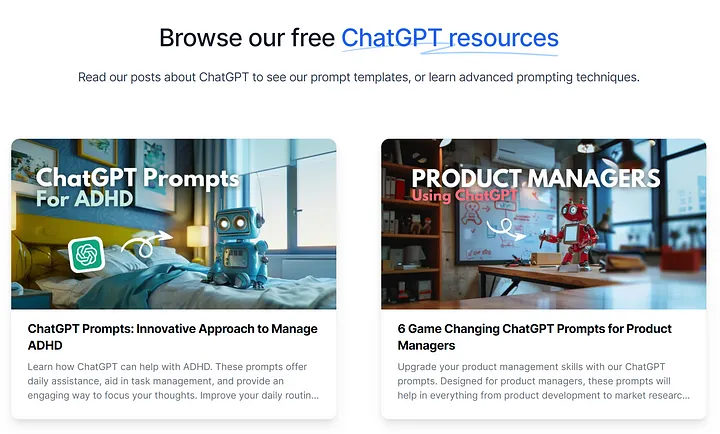How AI Is Running SEO Blogs. Here’s the Growth So Far Sure
How AI Is Running SEO Blogs. Here’s the Growth So Far Sure
Half a million impressions, thousands of clicks, and top Google rankings
A few months ago, I started a new company that I named after myself. In the aftermath of doing research, making plans, and establishing the website, the subsequent obstacle was attracting visitors.
With the knowledge that I have about search engine optimization (SEO), the option was clear: SEO blog articles for organic traffic.
But let me tell you something. The idea of spending hours producing material in my basement was not appealing to me. Nor did I want to recruit inexpensive writers from 3rd world nations.
I came to the conclusion that the most economical option would be to use AI.
My search engine optimization blog has been managed by AI for the last eight months. It never phoned in ill, never missed a deadline; it’s simply sitting there calmly, waiting for its next assignment.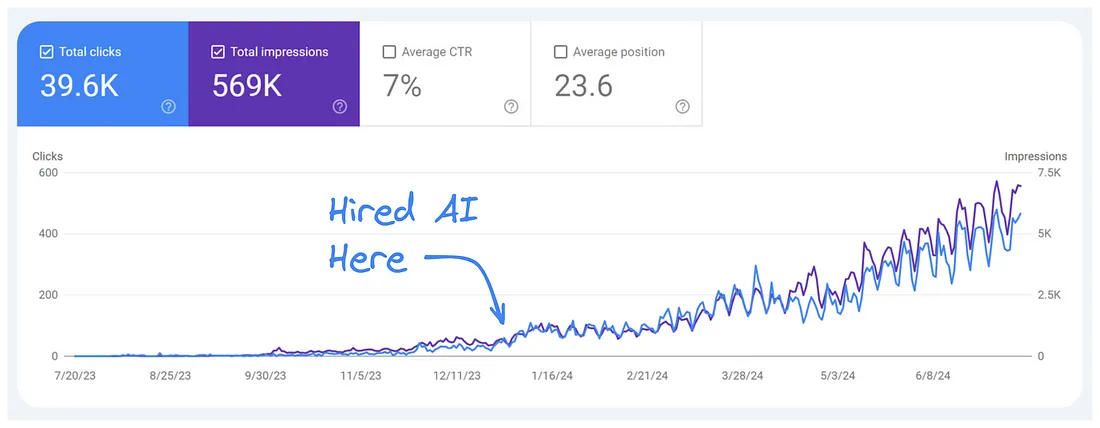
As you can see, the site is on its way to 50 thousand visitors, with 10 thousand monthly visits and steady development every week.
Not only is it expanding, it’s placing at the top of search results for several keywords.
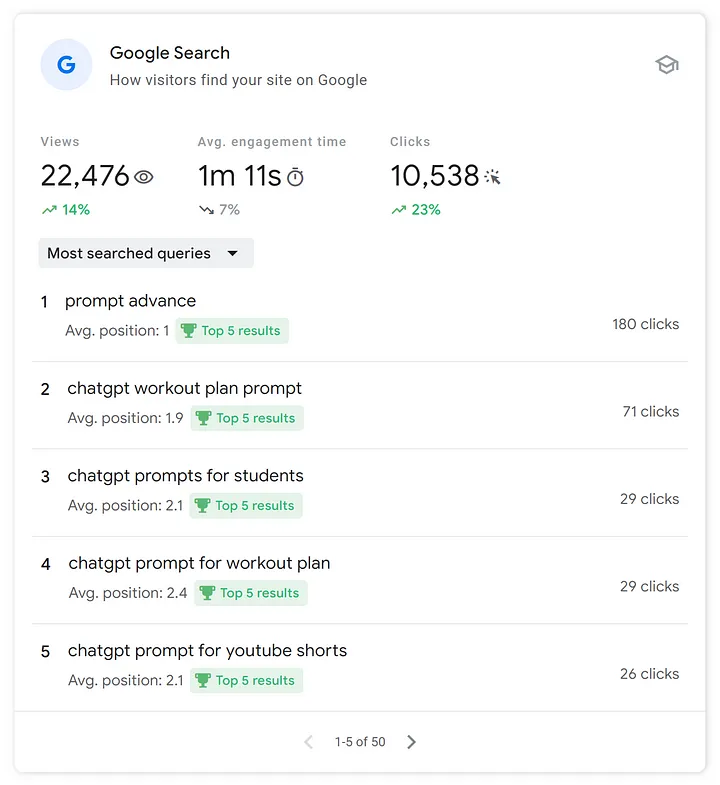
Seeing these outcomes is really satisfying. And I’m also optimistic the site will continue to expand. But this wasn’t always the case.
When I began, I was as afraid as a cat at a dog convention. Do you know why?
There are various concerns with AI-generated content for SEO:
-
AI writing may be readily spotted.
-
AI material doesn’t bring any fresh viewpoint.
-
Google may punish your site for employing AI content.
I had to discover answers for every one of these challenges. And that’s what I’m presenting today. I’m explaining how I overcame each hurdle, solved every difficulty, and built my site to where it is today.
I’ll give examples, pages, questions, procedures, and techniques I’ve learned along the road. So if you’re ready to hear my narrative, let’s dig in.
But first, let me briefly present the website to give you additional perspective.
What’s My SEO Site About
The site is called Prompt Advance, and it’s about ChatGPT prompts. The premise is simple: having a vast collection of ChatGPT prompts for varied uses.
When someone searches for “ChatGPT prompts to aid with ADHD," they’ll discover my site at the top, visit it, and get the prompts they need.
Sounds easy enough, but there’s a problem. People seek many types of prompts, and it’s hard to cover all of them by myself. That’s why I chose to employ AI as my writer.
How I’m Using AI to Grow IT
As I previously indicated, there were three challenges I had to tackle. And if I couldn’t crack all of them, my site wouldn’t expand.
Problem 1: AI material doesn’t bring any fresh viewpoint.
AI can’t come up with anything fresh. This is simply a reality, and there’s nothing we can do about it. Sure, AI can regurgitate many sources and spit out knowledge in a new manner, but it’s just that—a mix of existing information.
It’s not anything new.
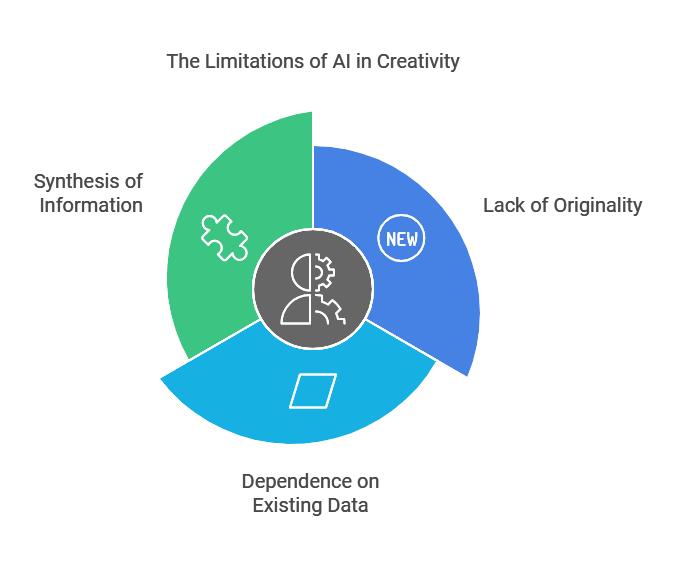
So how did I overcome this problem?
I just didn’t. I recognized that to deliver the finest quality information, I had to aid when required. Instead of letting AI handle everything, I’d jump in where it’s required most.
BTW: This is the portion I wouldn’t let AI do, and it’s the part I’m still doing manually.
For every blog article I published, I performed the following:
-
Researched the issue and the relevant challenges.
-
Thought about how ChatGPT might handle such difficulties.
-
Fed all the information back to AI.
To explain this with a real example, let’s suppose I want a blog article targeting the term “ChatGPT prompts for musicians.”
-
I investigate what musicians do in their day-to-day lives.
-
I see places where ChatGPT might aid them.
-
I write prompts for certain regions.
If I do this, I’m addressing issue #1 since I’m giving AI my discoveries and my viewpoint. If you’ve ever heard the term “good data in, good data out,” this is precisely that.
Problem 2: AI writing may be readily spotted
It’s commonly argued that AI material may be readily spotted, and if it is, you’re pretty well dead. I observed various programs claiming to assess whether text is AI-generated, and I believed Google would use something similar.
But Mama Mia, was I mistaken! Google doesn’t care.
They don’t care whether you create the material, if AI writes it, or even if your cat writes it. All they care about is that you deliver high-quality material that your audience likes reading.
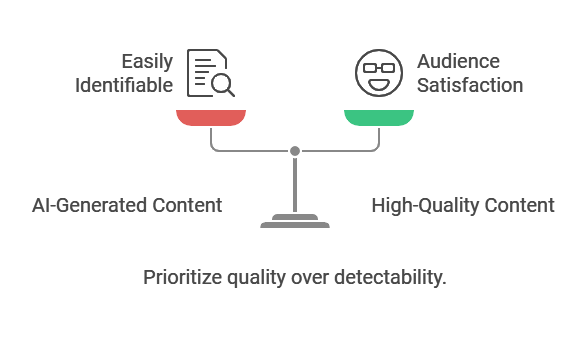
If you don’t believe me, here’s what they say:
Our emphasis on the quality of material, rather than how it is created, is valuable guidance that has helped us offer trustworthy, high-quality results to consumers for years. (source: Google)
It appears like issue #2 is already solved, but that’s not exactly accurate.
I still need a means to prompt ChatGPT for blog entries that satisfy my expectations. I want my blog entries to be written, formatted, and presented in a specific manner.
I tried several prompting strategies, but the results weren’t excellent. I poked around, watched some tutorials, and that’s when I heard about AI agents.
I don’t want to sound too technical, but here’s the core concept of AI agents:
-
You don’t ask AI to compose a blog article in one go.
-
You break the work into stages.
-
You let AI agents handle each step on their own.
Sounds nice in principle, but what does it look like in practice? Let my inner Picasso explain.
Each agent undertakes a different job, and each agent is particularly encouraged to do so.
For example, here’s the question I used for the meta description generator.
Prompt: You are an accomplished SEO copywriter. Craft a compelling SEO description based on [targeted keyword], inside
150–160 characters. Highlight unique value and integrate a clear call to action to enhance click-through rates.
Using this method, I obtained blog entries that are well-structured, simple to read, and look precisely as I want them to.
At this point, I had material with a fresh viewpoint and AI to compose it. The only thing left was making sure my site wouldn’t be blacklisted.
Problem 3: Google may punish your site for employing AI content
Alright, so I have my processes in place, and I’m banging out 4 articles every day. But the fact is that Google may step in at any point, ban me, and render my tiny enterprise useless.
So what do I do about it?
I ignore it, I keep digging, keep generating great stuff, and believe that Google will meet its word. After all, their emphasis is on the quality of information, rather than how it’s created.
Their words, not mine!
All I need to do is make sure I conduct excellent enough research and come up with a fresh new viewpoint every time I push the “publish” button.
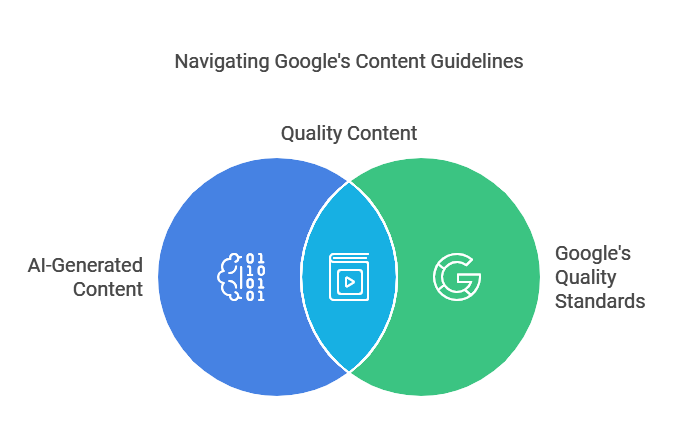
What’s Next?
For a brand new blog, these are excellent figures. I would be lying if I claimed I’m not thrilled with these outcomes.
I have published more than 100 pieces, covered every subject I wanted, and now I want to wait. I’ll examine how my material is performing and think of new themes to develop into.
With the quantity of blog content I have, my site can easily exceed 100,000 monthly visits, but that’s a target for the day.
I have published more than 100 pieces, covered every subject I wanted, and now I want to wait. I’ll examine how my material is performing and think of new themes to develop into.
With the quantity of blog entries I have, my site can easily exceed 100,000 monthly visits, but that’s a target for the future.

Adam Pennell
CEO / Co-Founder
Enjoy the little things in life. It's possible that one day you'll look back and realize that they were the significant things. A significant number of persons who fail in life are those who, when they gave up, were unaware of how near they were to achieving their goals.
.webp)




